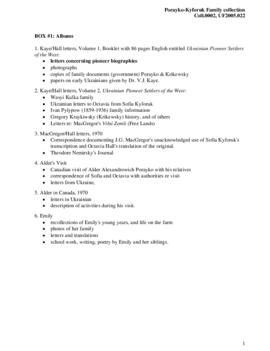The collection consists of documents pertaining to activities of NTSH, Edmonton branch. It includes correspondence, founding documents, programs, invitations, etc. The collection also comprises documents related to St. George's Parish in Edmonton, notebooks and newspaper clippings probably collected by someone else.
Shevchenko Scientific SocietyCollection consists of correspondence, memoirs, diaries, school reports, financial documents, photographs, research notes of Sophia Kyforuk and Octavia Hall.
Kyforuk familyThe collection is composed of еtwo groups of materials. Namely, the St. John the Baptist Church books, and self-published family histories.
The following books from the Peace River Country Collection are added to the Kule Folklore Centre library:
- Калинчук, Микола. Де ставок та млинок. Оповідання. Обгортка й рисунки С. Гординського. ЛЬвів: Видавництво "Вікна," 1930 (has a stamp of the Branch Youth Section Ukrainian Labor-Temple Association and the Association of United Ukrainian Canadians, High Prairie Branch;
- Настасівський М. Українська іміграція в Сполучених Державах. Ню Йорк: Видання Союзу українських робітничих організацій, 1934 (a stamp of the Association of United Ukrainian Canadians, Wolyn Branch);
- Луговий Ол. Визначне Жіноцтво України. Історичні життєписи у чотирьох частинах. Торонто: Український робітник, 1942 (a stamp of the Association of United Ukrainian Canadians, Wolyn Branch).
The collection contains materials of an artist Parasia Iwanec such as photographs and reproductions of her paintings, reviews, newspaper articles about the artist, exhibit programs, biography, personal documents, as well as embroidered shirts and tablecloths, ceramics. A small part of the collection consists of Wasyl Iwanec papers such as official documents, memoirs, and autobiography.
Iwanec, Parasia and WasylCollection consists of photographs depicting Byzantine rite churches in rural Alberta.
Semchishen, OrestThe collection consists of materials related to the "Church in Ruins" project initiated and conducted by Oleh Iwanusiw. In particular the collection comprises six albums of original photographs predominantly of churches, crosses and Christian sacral places, but also important cultural events and people, scholarly papers and other textual materials related the creator's scholarly interests.
Iwanusiw, Oleh and BozhenaThe collection consists of essays and supporting material collected by Frank Fingarsen while taking Ukrainian Folklore courses at the University of Alberta.
Fingarsen, FrankThis collection contains the results of two ethnographic trips to the Ukrainian communities in Brazil by Andriy Nahachewsky. The first trip took place from 4 May to 26 May 2009, and included Andriy Nahachewsky, Serge Cipko, John C. Lehr, and Maryna Hrymych. This was the first trip to Brazil for each of the participants, though they each had strong credentials in their disciplines and in fieldwork more generally. Thus the project goal was to cast a wide net for general orientation into the historical and contemporary life of the Ukrainian communities there. Each researcher also had specific personal goals. The trip included visits to Curitiba, Prudentópolis and several rural communities nearby, Craveiro in Santa Catarina, São Paulo, Brasília, and Foz do Iguaçu. The agenda included visits to an agricultural cooperative, meetings with diplomats and organizational representatives, and diverse individuals who could speak about life in their communities. Photographs by Hrymych, Lehr, and Cipko are also accessioned into the BMUFA and located in their own respective collections.
The second trip was undertaken by Andriy Nahachewsky, for 6 months from 14 November 2009 to 13 May 2010. The goal of the project was to continue the first exploratory fieldtrip, intensifying and expanding it. The project had a strong diachronic focus, documenting change in cultural traditions, to understand better how Ukrainian cultural content, rooted in 19th century rural traditions in western Ukraine, became transplanted, disappeared, adapted, and sometimes newly created in its diaspora setting in the Brazilian context. The intent was to be able to compare these processes with similar ones known from the Ukrainian Canadian context, as well as culture in western Ukraine itself, which also changed significantly over the 20th century: One cultural root, and three branches evolving on three continents over 120 years.
Another aspect of the fieldtrip was connected with Nahachewsky’s earlier “Local Culture and Diversity on the Prairies” project, which strove to provide documentation about regional differences in traditional Ukrainian culture in the Canadian setting. This аspect of the project was to try trace local differences in Brazilian culture in a similar way. Some of these regional differences were probably most clear in past decades. A third aspect was more synchronic, aimed to document contemporary life. Connected with this, the Brazil trip involved travelling to some 65 communities in the states of Paraná, Santa Catarina, Rio de Janeiro, and São Paulo, the main Ukrainian settlement areas in Brazil. The project involved recording some 300 audio interviews, 53 hours of video recordings of contemporary events, 14,000 photographs, and gathering many publications and manuscripts (in hard copy and reproduced digitally), as well as diverse artifacts. The overall focus in subject matter was broad, including material culture (farming practices, folk arts), customs (calendar holidays, weddings, funerals, etc) and performing arts (music, dance). Special foci developed for dance materials, religious images, church architecture, cemeteries, music, and weddings, because of Nahachewsky’s research background, opportunities, and experiences as the fieldwork proceeded. The trips were both funded by the Huculak Chair and the Kule Folklore Centre (for the first trip: Nahachewsky, Hrymych, and various shared expenses). During both trips, the hosts in the home base in Prudentópolis, as well as other locations in Brazil, were very warm and hospitable, open, and generous. A copy of the digital photo, audio, and video fieldwork materials was deposited in the Museu do Milênio in Prudentópolis.
Nahachewsky, Andriy